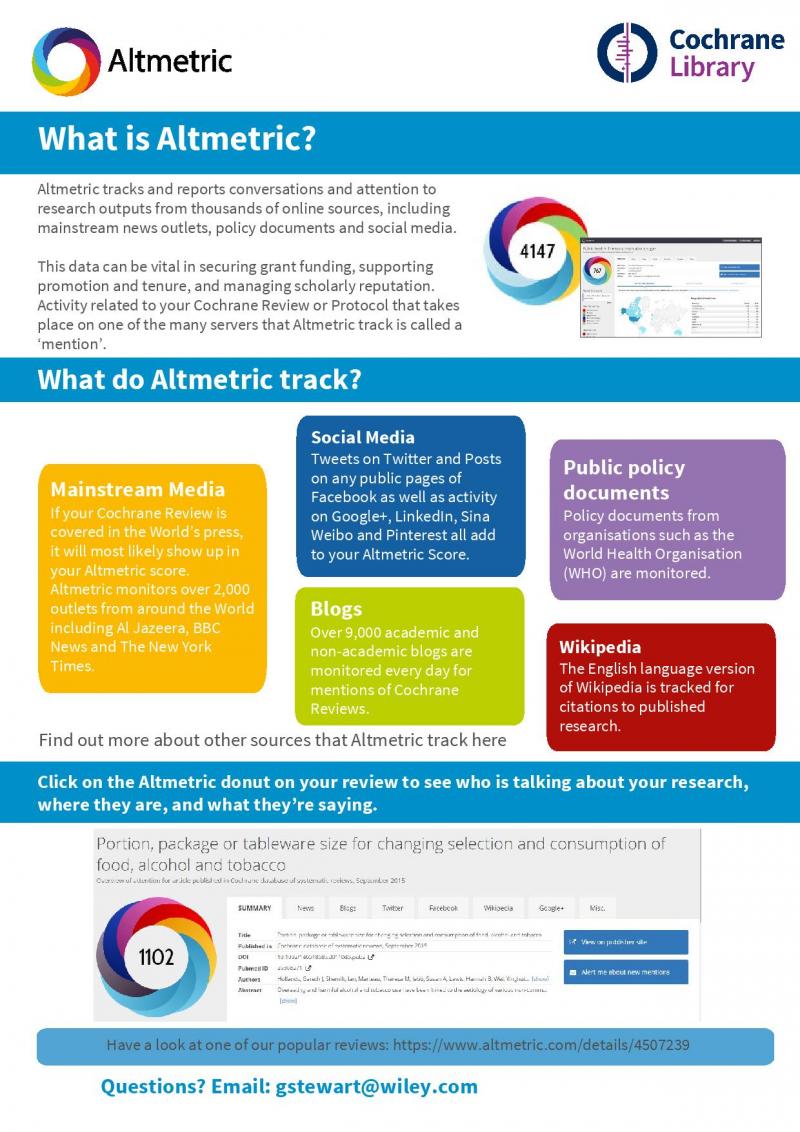

You may have noticed that the Altmetric ‘doughnut’ is now included at the start of every Cochrane Review and Protocol. But what does it mean? Working with Gavin Stewart, Cochrane Editor for our publishing partner Wiley, we’ve come up with all you need to know, including how authors, Managing Editors, and Review Groups can make the most of it.
What is Altmetric?
Alternative metrics provide a relatively new way of looking at the impact of published research and complement the traditional metrics such as usage and cites. In 2014, Wiley partnered with London-based company Altmetric to provide article-level metrics for more than 1500 journals and the Cochrane Library.
Altmetric track and report conversations and attention to research outputs from thousands of online sources, including mainstream news outlets, policy documents, and social media. Activity related to your Cochrane Review or Protocol that takes place on one of the many servers that Altmetric track is called a ‘mention’. The mentions are accumulated and weighted to give the published work an ‘Altmetric Score’.
What does Altmetric track?
Altmetric begin tracking mentions of your Cochrane Review or Protocol as soon as it is published in the Cochrane Database of Systematic Reviews. Examples of sources tracked for mentions include:
- Mainstream media: If your Cochrane Review is covered in the world’s press, it will most likely show up in your Altmetric score. Altmetric monitors over 2,000 outlets from around the world including Al Jazeera, BBC News, and The New York Times.
- Social media: Tweets on Twitter and posts on any public pages of Facebook as well as activity on Google+, LinkedIn, Sina Weibo, and Pinterest all add to your Altmetric Score.
- Blogs: More than 9,000 academic and non-academic blogs are monitored every day for mentions.
- Public policy documents: Policy documents from organizations such as the World Health Organization are monitored.
- Wikipedia: The English language version of Wikipedia is tracked for citations to published research.
It’s important to note that not all mentions contribute the same number to the Altmetric Score – the score is a weighted count. For example, a mention in the mainstream media contributes eight points, while a tweet contributes one point. More information on this here.

Why is the Altmetric score important?
The Altmetric score can show Cochrane authors and Managing Editors if published research is being disseminated beyond the academic world. You can look at who is talking about Cochrane Reviews or Protocols, and make sure that they are being interpreted accurately and getting to the right audiences. Making sure Cochrane evidence gets to decision-makers globally is part of Strategy to 2020.
The Altmetric data can also be vital in securing grant funding and supporting promotion and tenure, as it shows the broader influence and impact of your work.
How can I make sure Altmetric pick up mentions of my work?
There are a couple of things that are required for Altmetric to correctly allocate a mention of your published research to the Altmetric Score of your Cochrane Review or Protocol:
- Always link to a page that includes your research’s unique identifier: In the case of Cochrane Reviews and Protocols, this is the DOI (10.1002/14651858.CDXXXXXX.pubX). Only mentions that include a link to the published version of the Cochrane Review or Protocol on Wiley Online Library will count towards the Altmetric score. A link to the abstract on Cochrane.org does not count towards the Altmetric score.
- The link needs to be in the main body of the post: Unfortunately Altmetric can’t pick up any links included in headers or other sections of the page.
What if Altmetric have missed a mention of my work? How can I let them know?
The most common reasons that Altmetric might not include a mention in the Altmetric score of a research output is because a unique identifier was not present in the mention or the mention was made on a source that Altmetric do not track. If you think Altmetric have missed a mention of your work you can provide that information here.
How can I attract attention to my work?
- Plan early: Once your Cochrane Review is in the final stages of completion, it's time to think about making sure the right people know about it. You can find resources and help with this here.
- Share links to your work: Share via Twitter and other social media. Be sure to include relevant hashtags.
- Start your own blog (or contribute to an existing one): It’s a great way to build your online profile and position your research.
- Reach out to key bloggers: Make them aware of your work. Look at the Altmetric details pages for other articles in your discipline to see who might be interested.
- Talk to Cochrane about Wikipedia: Cochrane and Wikipedia have a strong partnership; you can learn about the history in this video. You can learn more about getting your Cochrane Review on Wikipedia here.
I hope this provides a little more insight into alternative metrics and makes you curious enough to check out the Altmetric Score’s on some of your favourite Cochrane Reviews! You can learn more about ‘Altmetric for Researchers’ here. If you have questions, you can contact the Cochrane CEAD team.
Download the summary below with working hyperlinks here


